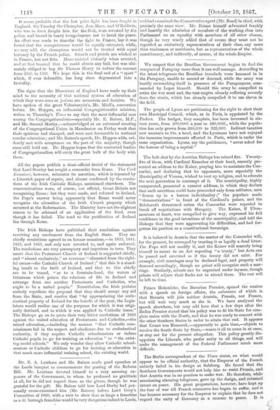The Irish Bishops have published their resolutions against receiving any
emolument from the English State. They are chiefly resolutions agreed to on former occasions,—in 1833, 1841. 1843, and 1863, and only now reverted to, and again endorsed. The resolutions are very peremptory and imperious in tone. They assert that the Protestant Church of Ireland is supported chiefly, and " almost exclusively," on revenues " alienated from the right- ful owner—the Catholic Church of Ireland ;" that this is a stand- ing insult to the faith of Ireland, and that to this chiefly are to be traced, " as to a fountain-head, the waters of bitterness which poison the relations of life in Ireland and estrange from one another Protestants and Catholics, who ought to be a united people." Nevertheless, the Irish prelates entirely repudiate the proposal that they should accept any aid from the State, and resolve that "by appropriating the eccle- siastical property of Ireland for the benefit of the poor, the Legis- lature would realize one of the purposes for which it was origi- nally destined, and to which it was applied in Catholic times." The Bishops go on to quote their very bitter resolutions of 1863 against the united education of Protestants and Catholics,—the mixed education,—including the menace " that Catholic com- missioners fail in the respect and obedience due to ecclesiastical authority, if they require Catholic schoolmasters or induce Catholic pupils to go for training or education " to " the exist- ing model schools." We only wonder they allow Catholic school- masters or Catholic children to go for training or education to that much more influential training school, the existing world.






























 Previous page
Previous page